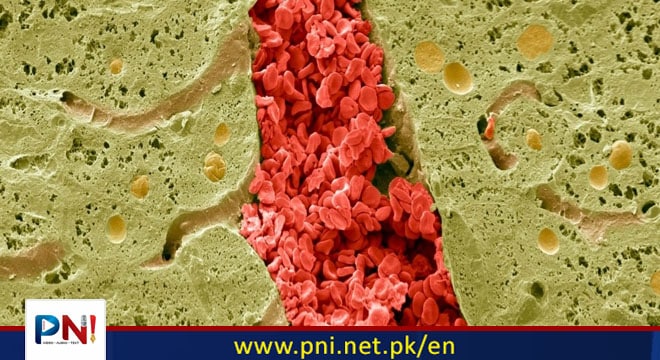ISLAMABAD, Sep 08 (Online): More than 1 billion people Trusted Source have obesity — a condition where a person has more weight or body fat than what most doctors consider healthy for their height and age.
Furthermore, about 28.5 million people Trusted Source around the world have high cholesterol, where a person has too much cholesterol in their body, which builds up inside their arteries and makes it hard for blood to flow properly.
People who are obese and/or have high cholesterol are at a higher risk for other diseases such as cardiovascular disease, high blood pressure, diabetes, and even certain types of cancer.
Now, researchers from the University of Massachusetts Amherst have designed a nanogel-based carrier Trusted Source to deliver a drug that mimics synthetic thyroid hormone Trusted Source directly to the liver.
Scientists found via a mouse model this liver-targeted drug system helped obese mice return to a healthy weight and lower their cholesterol levels.
This study was recently published in the journal PNAS NEXUS.
Targeting delivery to the liver
For this study, researchers engineered a nanogel-based carrier to deliver a drug directly to the liver.
Dr. S. Thai Thayumanavan, distinguished professor of chemistry and biomedical engineering, department head of biomedical engineering, director of the Center for Bioactive Delivery at the University of Massachusetts Amherst, and lead author of this study explained to Medical News Today:
“Our nanogels Trusted Source have an inherent propensity to home in the liver and then there is a specific need for targeting the hepatocytes Trusted Source in the liver when it comes to metabolic disorders Trusted Source. Therefore, we decorated these nanogels with additional chemical functionalities such that they will not only prefer to home in on the liver but also will be taken up by hepatocytes of the liver.”
The drug Dr. Thayumanavan and his team used in this study is a thyromimetic Trusted Source — a drug that mimics synthetic thyroid hormone.
“The drug is thought to target the thyroid hormone receptor beta Trusted Source, which is found throughout the body but predominantly in the liver,” he said.
“Our drug’s interaction with this receptor is responsible for activating a number of physiological responses, including fatty acid oxidation Trusted Source and reverse cholesterol pathwayTrusted Source (RCT), which may be the cause of the observed weight loss and lowering of cholesterol,“ explained Dr. Thayumanavan. “However, much more work needs to be done to confirm this hypothesis.”
Dr. Thayumanavan further noted that thyroid hormone mimics have been previously tested as cholesterol-lowering agents and are currently in clinical trials for the treatment of nonalcoholic steatohepatitis Trusted Source (NASH).
However, he said there have historically been two major issues — the bioavailability of these drugs and possible off-target effects when these thyromimetics reach other organs.
“Thyroid hormone mimics that are being tested Trusted Source in the clinic for NASH — and which are doing quite well — are of low potency so you’re not getting the full potential of the drug,” Dr. Thayumanavan continued. “Our thinking was that by combining a potent thyromimetic with our nanogel, we could eliminate toxicity associated with systemic exposure and gain activity by concentrating the drug at the site we wanted.”
Weight and cholesterol reduction
To conduct the study, Dr. Thayumanavan used a group of mice that were fed a high-fat, high-sugar, high-cholesterol diet for 10 weeks, resulting in their weight doubling. There was also a control group of mice fed a healthy diet during those same 10 weeks.
The obese mice were given the thyromimetic drug inside the nanogel-based carrier via intraperitoneal injection every day for 5 weeks.
At the end of the 5 weeks, researchers discovered the mice with obesity had returned to their previous weight, even if their high-fat diet continued.
Additionally, the mice given the drug experienced drops in their cholesterol levels and improvement in liver inflammation.
“We were confident that this approach would help improve the metabolic profile in the mice, such as cholesterol-lowering and reducing fatty liver,” Dr. Thayumanavan said.
“We were very surprised and excited to see the impact this had on body weight reduction. Although thyroid hormone mimics do lower weight, this usually comes with other side effects, which we did not see at all. Our drug appears to be very safe with no adverse effects.”
Follow the PNI Facebook page for the latest news and updates.









